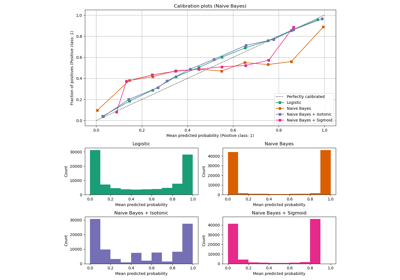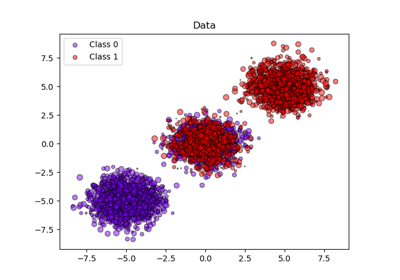brier_score_loss#
- sklearn.metrics.brier_score_loss(y_true, y_proba=None, *, sample_weight=None, pos_label=None, y_prob='deprecated')[source]#
Compute the Brier score loss.
The smaller the Brier score loss, the better, hence the naming with “loss”. The Brier score measures the mean squared difference between the predicted probability and the actual outcome. The Brier score always takes on a value between zero and one, since this is the largest possible difference between a predicted probability (which must be between zero and one) and the actual outcome (which can take on values of only 0 and 1). It can be decomposed as the sum of refinement loss and calibration loss.
The Brier score is appropriate for binary and categorical outcomes that can be structured as true or false, but is inappropriate for ordinal variables which can take on three or more values (this is because the Brier score assumes that all possible outcomes are equivalently “distant” from one another). Which label is considered to be the positive label is controlled via the parameter
pos_label, which defaults to the greater label unlessy_trueis all 0 or all -1, in which casepos_labeldefaults to 1.Read more in the User Guide.
- Parameters:
- y_truearray-like of shape (n_samples,)
True targets.
- y_probaarray-like of shape (n_samples,)
Probabilities of the positive class.
- sample_weightarray-like of shape (n_samples,), default=None
Sample weights.
- pos_labelint, float, bool or str, default=None
Label of the positive class.
pos_labelwill be inferred in the following manner:if
y_truein {-1, 1} or {0, 1},pos_labeldefaults to 1;else if
y_truecontains string, an error will be raised andpos_labelshould be explicitly specified;otherwise,
pos_labeldefaults to the greater label, i.e.np.unique(y_true)[-1].
- y_probarray-like of shape (n_samples,)
Probabilities of the positive class.
Deprecated since version 1.5:
y_probis deprecated and will be removed in 1.7. Usey_probainstead.
- Returns:
- scorefloat
Brier score loss.
References
Examples
>>> import numpy as np >>> from sklearn.metrics import brier_score_loss >>> y_true = np.array([0, 1, 1, 0]) >>> y_true_categorical = np.array(["spam", "ham", "ham", "spam"]) >>> y_prob = np.array([0.1, 0.9, 0.8, 0.3]) >>> brier_score_loss(y_true, y_prob) np.float64(0.037...) >>> brier_score_loss(y_true, 1-y_prob, pos_label=0) np.float64(0.037...) >>> brier_score_loss(y_true_categorical, y_prob, pos_label="ham") np.float64(0.037...) >>> brier_score_loss(y_true, np.array(y_prob) > 0.5) np.float64(0.0)


